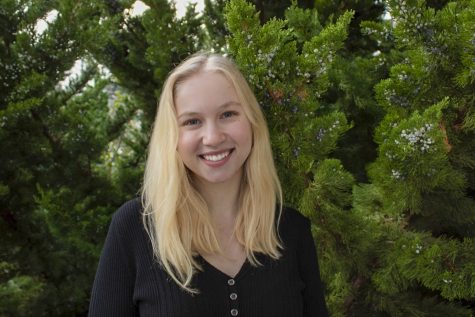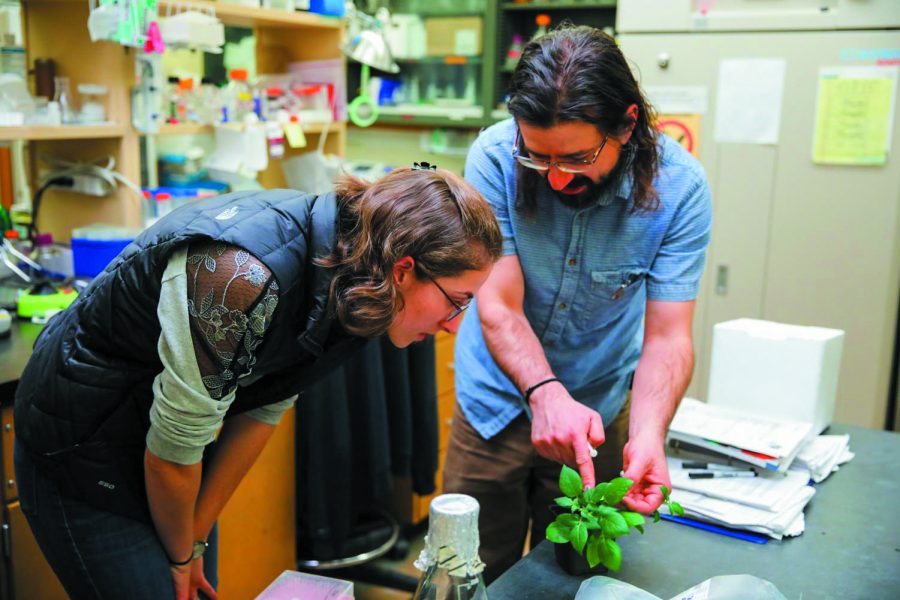Letter from the editors: Research section will encourage young science writers, report findings
Editor-in-chief, research editor share common passion for understanding science; reporters will cover science in accessible detail
BENJAMIN MICHAELIS | DAILY EVERGREEN FILE
Evergreen editor-in-chief Emma Ledbetter started her science writing career with an article about drought resistance in plants when she was Mint editor.
February 4, 2021
I have never met a professor who was not excited to hear I am pursuing a career in science communication instead of medicine. In fact, every person I share that with said something similar: we need more people like you.
Not like me, specifically, but people who want to do what I want to do.
We need people who can confidently communicate scientific information with the people who need to hear it most. We need people who are curious, who want answers and who want to share their findings with others.
Sure, my microbiology major may have contributed to starting a research section. But more than that, I saw a need that I had the ability to address.
Starting a research section allows The Daily Evergreen to train reporters to cover science and research findings that have far-reaching implications. My hope is that students writing for research will consider a career in science communication after being exposed to it here.
I was fortunate enough to have editors take a chance on me. I was given an opportunity to write an article about drought resistance in plants when I was Mint editor. I had never written anything like that before, but one of my editors patiently coached me through the process. That article changed my outlook and my future. Having a whole section dedicated to this field can open up countless doors for young journalists.
Research writers have access to a wealth of information here: current and former professional science writers, journalism instructors, researchers and editors who want to produce accurate, quality content.
In the past few weeks, we have covered a range of topics from global warming to engineering products that improve quality of life. And there is still so much for us to cover.
To all the professors, researchers, graduate students, undergraduates and others reading this: we are here to cover your work. We want to know what you are passionate about and how you think your work can change the world. We would love to tell your story.
– Emma Ledbetter, Evergreen editor-in-chief
When Emma asked me to be the research editor, I was pretty excited for it. While it has been a while since I have written a research article (in large part, because I was an editor last semester), articles involving science were always my favorite ones to write.
Emma may have chosen to major in microbiology because she loves doing research, but she found out along the way that she also loves communicating research to a lay public. When I chose to be a multimedia journalism major, I liked science but never had to communicate it to anyone other than my science teachers. I was certainly not looking for a career in science. I don’t want to see scientific equations, but I am fascinated by science. I just don’t care for the nitty-gritty of the research.
When article after article of COVID-19 news started being published in March, I was captivated by the scientific findings that came out. I was able to recall what RNA viruses were from high school biology and how those differ from DNA viruses. I like knowing that level of detail and how that affects the topic at hand.
I can’t recall what my first research article was about, but I can tell you, it was published in The Daily Evergreen. And looking at what I know now about communicating science, it probably wasn’t very good because it was my first try.
I’ve enjoyed writing about a specific protein, that when blocked, could help people dying from COVID-caused pneumonia, scientists who used 3D printing to help treat tumors in a cat, and research into elk hoof disease (and the person I was interviewing even showed me an elk hoof to emphasize how the disease affects hooves).
I remember the articles I always had questions about were the ones involving science, the ones where I struggled to explain to a lay public what the researchers were doing. As I wrote more articles, I got better at it (although I’m still looking to improve).
In my experience so far as research editor, I have certainly had to help reporters simplify the science, and I hope the readers of those articles understand our explanations about the science because I am still learning too.
If you know of research happening that we may not know about, please email me at [email protected]
– Cheryl Aarnio, research editor










